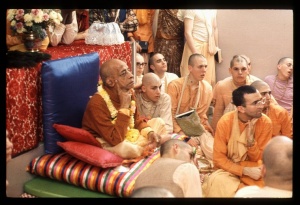SB 1.18.32: Difference between revisions
m (1 revision(s)) |
No edit summary |
||
| Line 1: | Line 1: | ||
{{info | {{info | ||
|speaker= | |speaker=Sūta Gosvāmī | ||
|listener= | |listener=Sages of Naimiṣāraṇya | ||
}} | }} | ||
[[Category:Srimad-Bhagavatam - Canto 01 Chapter 18]] | |||
[[Category:Bhagavatam Verses Spoken by Suta Gosvami - Vanisource|011832]] | |||
<div style="float:left">'''[[Srimad-Bhagavatam]] - [[SB 1|First Canto]] - [[SB 1.18: Maharaja Pariksit Cursed by a Brahmana Boy|Chapter 18: Mahārāja Parīkṣit Cursed by a Brāhmaṇa Boy]]'''</div> | |||
<div style="float:right">[[File:Go-previous.png|link=SB 1.18.31]] '''[[SB 1.18.31]] - [[SB 1.18.33]]''' [[File:Go-next.png|link=SB 1.18.33]]</div> | |||
{{CompareVersions|SB|1.18.32|SB 1965|SB 1972-77}} | |||
{{RandomImage}} | |||
==== TEXT 32 ==== | ==== TEXT 32 ==== | ||
<div class="verse"> | |||
<div | :tasya putro 'titejasvī | ||
tasya putro 'titejasvī | :viharan bālako 'rbhakaiḥ | ||
viharan bālako 'rbhakaiḥ | :rājñāghaṁ prāpitaṁ tātaṁ | ||
rājñāghaṁ prāpitaṁ tātaṁ | :śrutvā tatredam abravīt | ||
śrutvā tatredam abravīt | |||
</div> | </div> | ||
| Line 18: | Line 23: | ||
==== SYNONYMS ==== | ==== SYNONYMS ==== | ||
<div class="synonyms"> | |||
<div | ''tasya''—his (the sage's); ''putraḥ''—son; ''ati''—extremely; ''tejasvī''—powerful; ''viharan''—while playing; ''bālakaḥ''—with boys; ''arbhakaiḥ''—who were all childish; ''rājñā''—by the King; ''agham''—distress; ''prāpitam''—made to have; ''tātam''—the father; ''śrutvā''—by hearing; ''tatra''—then and there; ''idam''—this; ''abravīt''—spoke. | ||
</div> | </div> | ||
| Line 26: | Line 30: | ||
==== TRANSLATION ==== | ==== TRANSLATION ==== | ||
<div class="translation"> | |||
<div | |||
The sage had a son who was very powerful, being a brāhmaṇa's son. While he was playing with inexperienced boys, he heard of his father's distress, which was occasioned by the King. Then and there the boy spoke as follows. | The sage had a son who was very powerful, being a brāhmaṇa's son. While he was playing with inexperienced boys, he heard of his father's distress, which was occasioned by the King. Then and there the boy spoke as follows. | ||
</div> | </div> | ||
| Line 34: | Line 37: | ||
==== PURPORT ==== | ==== PURPORT ==== | ||
<div class="purport"> | |||
Due to Mahārāja Parīkṣit's good government, even a boy of tender age, who was playing with other inexperienced boys, could become as powerful as a qualified ''brāhmaṇa''. This boy was known as Śṛṅgi, and he achieved good training in ''brahmacarya'' by his father so that he could be as powerful as a ''brāhmaṇa'', even at that age. But because the age of Kali was seeking an opportunity to spoil the cultural heritage of the four orders of life, the inexperienced boy gave a chance for the age of Kali to enter into the field of Vedic culture. Hatred of the lower orders of life began from this ''brāhmaṇa'' boy, under the influence of Kali, and thus cultural life began to dwindle day after day. The first victim of brahminical injustice was Mahārāja Parīkṣit, and thus the protection given by the King against the onslaught of Kali was slackened. | |||
</div> | |||
<div | |||
<div style="float:right; clear:both;">[[File:Go-previous.png|link=SB 1.18.31]] '''[[SB 1.18.31]] - [[SB 1.18.33]]''' [[File:Go-next.png|link=SB 1.18.33]]</div> | |||
</div> | __NOTOC__ | ||
__NOTOC__ | __NOEDITSECTION__ | ||
Revision as of 02:53, 3 May 2021

A.C. Bhaktivedanta Swami Prabhupada
TEXT 32
- tasya putro 'titejasvī
- viharan bālako 'rbhakaiḥ
- rājñāghaṁ prāpitaṁ tātaṁ
- śrutvā tatredam abravīt
SYNONYMS
tasya—his (the sage's); putraḥ—son; ati—extremely; tejasvī—powerful; viharan—while playing; bālakaḥ—with boys; arbhakaiḥ—who were all childish; rājñā—by the King; agham—distress; prāpitam—made to have; tātam—the father; śrutvā—by hearing; tatra—then and there; idam—this; abravīt—spoke.
TRANSLATION
The sage had a son who was very powerful, being a brāhmaṇa's son. While he was playing with inexperienced boys, he heard of his father's distress, which was occasioned by the King. Then and there the boy spoke as follows.
PURPORT
Due to Mahārāja Parīkṣit's good government, even a boy of tender age, who was playing with other inexperienced boys, could become as powerful as a qualified brāhmaṇa. This boy was known as Śṛṅgi, and he achieved good training in brahmacarya by his father so that he could be as powerful as a brāhmaṇa, even at that age. But because the age of Kali was seeking an opportunity to spoil the cultural heritage of the four orders of life, the inexperienced boy gave a chance for the age of Kali to enter into the field of Vedic culture. Hatred of the lower orders of life began from this brāhmaṇa boy, under the influence of Kali, and thus cultural life began to dwindle day after day. The first victim of brahminical injustice was Mahārāja Parīkṣit, and thus the protection given by the King against the onslaught of Kali was slackened.